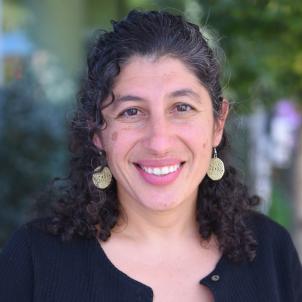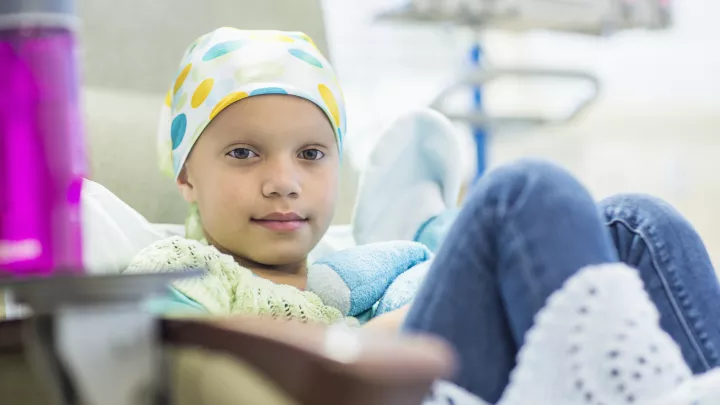
MIBG Combination Therapies Show Promise in Neuroblastoma
New results from a phase 1 clinical trial have shown that combining MIBG therapy with immunotherapy—as well as a radiation-sensitizing drug called vorinostat—may hold promise for patients with relapsed or refractory high-risk neuroblastoma.
The trial—the first to combine MIBG therapy with immunotherapy—was led by the New Approaches to Neuroblastoma Therapy (NANT) Consortium, which is headquartered at Children’s Hospital Los Angeles. Results were presented at the Advances in Neuroblastoma Research meeting, held May 15-18 in Amsterdam.
“From our preliminary data, it appears that adding immunotherapy, as well as vorinostat, is well-tolerated by patients and may improve the response rate to MIBG therapy,” says Araz Marachelian, MD, MS, Medical Director of the MIBG Neuroblastoma Program at Children’s Hospital Los Angeles and the study’s sponsor investigator. “We are excited about these early results and are looking forward to launching a larger clinical trial later this year.”
A specialized radiation treatment
MIBG (metaiodobenzylguanidine) has long been considered a promising treatment for neuroblastoma, a childhood cancer that arises from immature nerve cells.

Originally used as a blood pressure medication, MIBG is easily absorbed by neuroblastoma cells. In MIBG therapy, the compound is combined with radioactive iodine I-131 and given to patients through an IV infusion.
“It’s a much more targeted way of delivering radiation directly into neuroblastoma cells throughout the body,” Dr. Marachelian explains.
MIBG therapy is not approved for children by the Food and Drug Administration and is available only through clinical trials at select centers. Past studies have found that 30% of patients with relapsed or treatment-resistant neuroblastoma respond to the therapy—with tumors significantly shrinking. An additional 30% of patients show tumor stabilization with this therapy.
Study findings
To try to improve those results, researchers are now studying ways to combine MIBG with other treatments.
In this phase 1 trial, investigators across 11 centers, including Children’s Hospital Los Angeles, enrolled 45 children and young adults with relapsed or refractory (treatment-resistant) high-risk neuroblastoma.
In the first part of the study, patients received MIBG therapy, followed a week later by infusions of dinutuximab—an immunotherapy drug that is FDA approved for children with neuroblastoma.
In the second part of the trial, investigators added vorinostat before, during and following the MIBG therapy. That addition was made after a separate phase 2 randomized controlled trial—also led by the NANT consortium—found that combining vorinostat with MIBG therapy doubled objective response rates compared with MIBG alone.
A total of 14 patients received this novel combination of vorinostat, MIBG therapy and immunotherapy. Most patients completed the full treatment cycle twice.
Early data found that 73% of patients had some level of response to the combined vorinostat-MIBG-immunotherapy treatment, with nearly half experiencing a complete or partial response.
Launching a larger trial
In light of these findings, the NANT consortium is now planning a phase 2 clinical trial to study these MIBG combination therapies in more patients and in a randomized fashion.
That multicenter trial, which also will be sponsored by Children’s Hospital Los Angeles, will open later this year and will randomize patients into three arms: MIBG with vorinostat, MIBG with immunotherapy, and MIBG with both immunotherapy and vorinostat.
“This new trial will help us understand which of these combinations is most effective,” Dr. Marachelian says. “These studies are like building blocks. We use knowledge gained from each one as we work to develop new therapeutic approaches for patients.”
Study abstract authors were Thomas Cash, Araz Marachelian, Steven G. DuBois, Yueh-Yun Chi, Susan G. Groshen, Anahit Nargizyan, Anasheh Shamirian, Mary Crowley, Margaret E. Macy, Navin Pinto, Ami V. Desai, Meaghan Granger, Kieuhoa T. Vo, Paul Sondel, Shahab Asgharzadeh, Brian D. Weiss, Yael P. Mosse, Katherine K. Matthay, Julie R. Park and Kelly C. Goldsmith.


